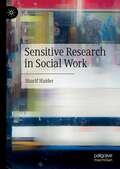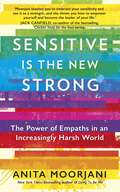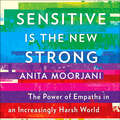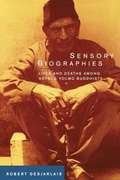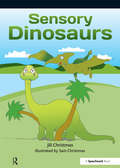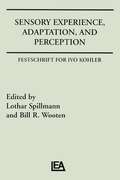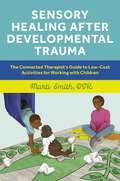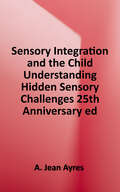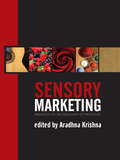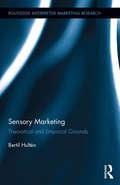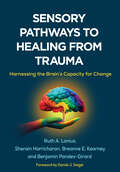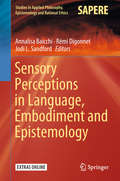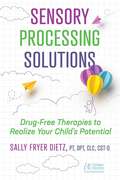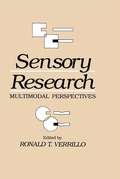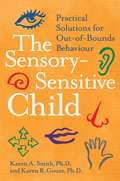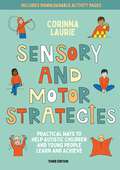- Table View
- List View
Sensitive Research in Social Work
by Sharif HaiderThis book addresses issues related with researching sensitive topics in social work, focusing on marginalized, vulnerable and hard to reach people. It covers the definition, characteristics, challenges and opportunities of sensitive research, its philosophical roots and methodological debates, and the skills and values that are required along with the ethical, political and legal issues involved in conducting social work research. This book will cover innovative research methods appropriate for research on sensitive topics involving vulnerable people. It shines light on how to use traditional research methods sensitively, and how to generate data while minimizing the harm that can potentially be caused to research participants and researchers.
Sensitive Soul: The Unseen Role of Emotion in Extraordinary States
by Michael A. JawerExplores how emotion underlies personality, triggers the development of non-ordinary states and perceptions, and connects all life • Shows how the flow of our emotions shapes individual minds and personalities • Reveals the significant role of emotion in PTSD, alexithymia (not knowing what one is feeling), autism, savantism, synesthesia (overlapping senses), déjà vu, phantom pain, migraines, and extreme empathy • Looks at the emotional lives of animals, demonstrating how life-threatening emergencies can trigger amazing sensitivities and abilities in them Emotion, as it exists within and between people, underpins personality, spirituality, and a range of extraordinary perceptions, conditions, and experiences. These include déjà vu, phantom pain, post-traumatic stress disorder (PTSD), and extreme empathy, where people instantaneously feel the physical or emotional pain of another. Many gifted children, those with synesthesia, and people with autism--not to mention highly sensitive people in general--report forms of innate &“knowing&” and even paranormal experiences. In this exploration of the role of emotion in non-ordinary states and abilities, Michael Jawer shows how the flow of our emotions and those of the people around us greatly influences the development of exceptional capacities and sensitivities. Drawing on a range of scientific studies, Jawer explores how 5 remarkable kinds of people--individuals with autism, synesthesia, savantism, child prodigies, and children who remember past lives--are linked through the biology of emotion and how a hidden emotional intensity underlies both autism and anomalous perception. He examines the psychological concept of thin and thick boundaries and how those with thin boundaries--those who are more environmentally sensitive--have a greater predisposition toward empathy, synesthesia, psi abilities, and extraordinary states of perception. Sharing extraordinary examples, the author explores how strong emotion may endure through time and space, possibly even after death. He also looks at the emotional lives of animals, our soulful connections with them, and how life-threatening emergencies can trigger amazing sensitivities and abilities in our fellow creatures. Revealing the unseen role of emotion in mind and personality, Jawer shows that emotion is the binding force that connects us with one another, with all of life, and with nature itself.
Sensitive is the New Strong: The Power of Empaths in an Increasingly Harsh World
by Anita MoorjaniThe bestselling author of Dying to Be Me returns with an inspirational guide for sensitive people looking to fully harness their gifts of intuition and empathy in today's harsh world.Anita Moorjani astounded fans across the globe with her bestselling book about overcoming cancer and her life-changing near-death experience. Now she returns with Sensitive Is the New Strong, a powerful, heartfelt book on harnessing and fostering empathic gifts in today's difficult, fear-based world.Empaths not only sense other people's emotions, but also absorb them-sometimes to their own disadvantage, often leading to overwhelming sensory overload and feelings of confusion or low self-esteem. Their willingness to help and please others might make them prey to opportunists or cause them to give away more energy than they can afford. But Anita Moorjani argues that it's possible to turn this onslaught of emotional burden into a powerful tool. In a time when traits like sensitivity, kindness and compassion are sorely undervalued, Moorjani helps empaths-whether emerging or acknowledged-navigate obstacles they may face and identify what makes them unique. Finally, she teaches them how to claim their true powers as empaths, to be their most authentic selves, shifting their own trajectory and leading to shift the trajectory of the planet in a more conscientious direction.Filled with eye-opening personal anecdotes, insights from other empaths, meditations and self-affirming mantras, Sensitive Is the New Strong is an empowering book that demonstrates the positive power of sensitivity.'Never has a book resonated with me so strongly.' - You Magazine 'I highly recommend this book for all empaths and their loved ones.' - Jack Canfield, co-author of the #1 New York Times bestselling Chicken Soup for the Soul series'Sensitive is the New Strong is the absolute truth of what it's like to live as an empath. It teaches us how to understand that our inherent sensitivity is not a liability, it's a strength.' - Christiane Northrup, MD and New York Times bestselling author of Women's Bodies
Sensitive is the New Strong: The Power of Empaths in an Increasingly Harsh World
by Anita MoorjaniA practical and invaluable resource for sensitive people who have felt exploited or belittled, and seek to fully embrace their gifts of intuition, compassion and empathy in today's fear-based world.The New York Times bestselling author of Dying to Be Me returns with an inspirational guide for sensitive people looking to fully harness their gifts of intuition and empathy in today's harsh world.International speaker, cancer survivor, and author of Dying to Be Me Anita Moorjani astounded fans across the globe with her bestselling book about overcoming cancer and her life-changing near-death experience. Now she returns with Sensitive Is the New Strong, a powerful, heartfelt book on harnessing and fostering empathic gifts in today's difficult, fear-based world.Empaths not only sense other people's emotions, but also absorb them-sometimes to their own disadvantage, often leading to overwhelming sensory overload and feelings of confusion or low self-esteem. Their willingness to help and please others might make them prey to opportunists or cause them to give away more energy than they can afford. But Anita Moorjani argues that it's possible to turn this onslaught of emotional burden into a powerful tool. In a time when traits like sensitivity, kindness and compassion are sorely undervalued, Moorjani helps empaths-whether emerging or acknowledged-navigate obstacles they may face and identify what makes them unique. Finally, she teaches them how to claim their true powers as empaths, to be their most authentic selves, shifting their own trajectory and leading to shift the trajectory of the planet in a more conscientious direction.Filled with eye-opening personal anecdotes, insights from other empaths, meditations and self-affirming mantras, Sensitive Is the New Strong is an empowering book that demonstrates the positive power of sensitivity.'I highly recommend this book for all empaths and their loved ones.' - Jack Canfield, co-author of the #1 New York Times bestselling Chicken Soup for the Soul series'Sensitive is the New Strong is the absolute truth of what it's like to live as an empath. It teaches us how to understand that our inherent sensitivity is not a liability, it's a strength.' - Christiane Northrup, MD and New York Times bestselling author of Women's Bodies'Sensitive is the New Strong is a gorgeous and powerful field guide to the empath living in today's wild world.' - Laura Berman, PhD and author of Quantum Love'Sensitive is the New Strong is a book that provides YOU with ground-breaking information, tools, and exercises in understanding the challenges faced by empaths.' - Nick Ortner, New York Times bestselling author of The Tapping Solution(P) 2021 Simon & Schuster Audio
Sensitive: The Hidden Power of the Highly Sensitive Person in a Loud, Fast, Too-Much World
by Jenn Granneman Andre Sólo&“This important book reframes the way we think about sensitivity—our own or someone else&’s—and shines a light on the great power in being highly attuned to the world.&”—Susan Cain, #1 New York Times bestselling author of Bittersweet and QuietA paradigm-shifting look at a long-undervalued yet hugely beneficial personality trait, from the creators of the world&’s largest community for highly sensitive people &“Don&’t be so sensitive!&”Everyone has a sensitive side, but nearly one in three people have the genes to be more sensitive than others—both physically and emotionally. These are the people who pause before speaking and think before acting; they tune in to subtle details and make connections that others miss. Whether introverted or extroverted, they tend to be bighearted, creative, and wired to go deep, yet society tells them to hide the very sensitivity that makes them this way. These are the world&’s &“highly sensitive people,&” and Sensitive is the book that champions them.From the creators of the world&’s largest community for sensitive people, Sensitive teaches us how to unlock the potential in this undervalued strength and leverage it across the most important areas of our lives: friendships and intimate relationships, the workplace, leadership, and parenting. Through fascinating research and expert storytelling, Jenn Granneman and Andre Sólo—sensitive people themselves—show us that the way to thrive as a sensitive person is not to hide our sensitivity but to embrace it, and how to do that in every area of life. Weaving together actionable advice, relatable anecdotes, and the latest scientific research, Granneman and Sólo demonstrate how leaning into sensitivity unlocks a powerful boost effect to propel us ahead in life. They hand us the tools and insights we need to thrive as sensitive people in a loud, fast, too-much world.A powerfully validating, destigmatizing, and practical book, Sensitive plants a gently fluttering flag in the ground for sensitive people everywhere. This inspiring book has the power to change, once and for all, how we see sensitive people—and how they see themselves.
Sensitive: The Power of Feeling in a World That Doesn't
by Hannah WalkerHannah Walker is a very sensitive person, along with at least a fifth of the population. Like many, she was conditioned to believe this was a weakness and a trait that she should try and overcome. When she had her first child and realised that her little girl was sensitive too, Hannah decided to find out whether sensitivity might in fact be a positive trait. Her question led to some fascinating answers and ongoing research that suggests survival and thriving is not only limited to the fittest, but to the sensitive.If you are someone, or know someone who sat at the edge of the party as a child, or waits to be sure about what you want to say only to never get a word in, or jumps at loud noises, or worries that you cry so easily at a beautiful piece of art, or that you just seem to feel so much (too much), this book reveals the strengths in these traits and also how we need to embrace them rather than be embarrassed by them. People who are highly sensitive are highly caring, they are observant and notice new ways of doing things in difficult circumstances, they are able to follow their gut instincts (a real, scientific thing), they bring teams together, they listen well and are far more resilient than we've often been led to believe. The problem is that in today's noisy world, they often suffer from lower self-esteem and confidence levels.Like Susan Cain's Quiet, which showed the power of introverts in an extrovert world, Sensitive overturns old cliches and stereotypes and suggests a new way of looking at a trait that people so often feel ashamed of but that has so much untapped potential.
Sensitive: The Power of Feeling in a World that Doesn't
by Hannah Jane WalkerHannah Walker is a very sensitive person, along with at least a fifth of the population. Like many, she was conditioned to believe this was a weakness and a trait that she should try and overcome. When she had her first child and realised that her little girl was sensitive too, Hannah decided to find out whether sensitivity might in fact be a positive trait. Her question led to some fascinating answers and ongoing research that suggests survival and thriving is not only limited to the fittest, but to the sensitive.If you are someone, or know someone who sat at the edge of the party as a child, or waits to be sure about what you want to say only to never get a word in, or jumps at loud noises, or worries that you cry so easily at a beautiful piece of art, or that you just seem to feel so much (too much), this book reveals the strengths in these traits and also how we need to embrace them rather than be embarrassed by them. People who are highly sensitive are highly caring, they are observant and notice new ways of doing things in difficult circumstances, they are able to follow their gut instincts (a real, scientific thing), they bring teams together, they listen well and are far more resilient than we've often been led to believe. The problem is that in today's noisy world, they often suffer from lower self-esteem and confidence levels.Like Quiet, which showed the power of introverts in an extrovert world, Sensitive overturns old cliches and stereotypes and suggests a new way of looking at a trait that people so often feel ashamed of but that has so much untapped potential.(P) Octopus Publishing Group 2021
Sensorial Investigations: A History of the Senses in Anthropology, Psychology, and Law (Perspectives on Sensory History)
by David HowesDavid Howes’s sweeping history of the senses in the disciplines of anthropology and psychology and in the field of law lays the foundations for a sensational jurisprudence, or a way to do justice to and by the senses of other people.In part 1, Howes demonstrates how sensory ethnography has yielded alternative insights into how the senses function and argues convincingly that each culture should be approached on its own sensory terms. Part 2 documents how the senses have been disciplined psychologically within the Western tradition, starting with Aristotle and moving through the rise of Lockean empiricism and cognitive neuroscience. Here, Howes presents an anthropologically informed critique of experimental and cognitive psychology, sensory science, and phenomenology. In part 3, he introduces the paradigm of the “historical anthropology of the senses and sensation” and applies it to the analysis of trade relations between Europe and China in the early modern period, to the treaty-making process in North America during the colonial period, and to all the unresolved disputes over land rights and Indigenous sovereignty that continue to this day, arguing that these differences are rooted in a cultural clash of sensoria.Designed for the classroom, Sensorial Investigations displays an expansive critical engagement with generations of scholarship. It is essential reading for students and scholars of the history and anthropology of the senses, the psychology of sensation, and socio-legal studies.
Sensorimotor Psychotherapy: Interventions for Trauma and Attachment (Norton Series on Interpersonal Neurobiology)
by Pat Ogden Janina FisherA book for clinicians and clients to use together that explains key concepts of body psychotherapy. The body's intelligence is largely an untapped resource in psychotherapy, yet the story told by the "somatic narrative"-- gesture, posture, prosody, facial expressions, eye gaze, and movement -- is arguably more significant than the story told by the words. The language of the body communicates implicit meanings and reveals the legacy of trauma and of early or forgotten dynamics with attachment figures. To omit the body as a target of therapeutic action is an unfortunate oversight that deprives clients of a vital avenue of self-knowledge and change. Written for therapists and clients to explore together in therapy, this book is a practical guide to the language of the body. It begins with a section that orients therapists and clients to the volume and how to use it, followed by an overview of the role of the brain and the use of mindfulness. The last three sections are organized according to a phase approach to therapy, focusing first on developing personal resources, particularly somatic ones; second on utilizing a bottom-up, somatic approach to memory; and third on exploring the impact of attachment on procedural learning, emotional biases, and cognitive distortions. Each chapter is accompanied by a guide to help therapists apply the chapter's teachings in clinical practice and by worksheets to help clients integrate the material on a personal level. The concepts, interventions, and worksheets introduced in this book are designed as an adjunct to, and in support of, other methods of treatment rather than as a stand-alone treatment or manualized approach. By drawing on the therapeutic relationship and adjusting interventions to the particular needs of each client, thoughtful attention to what is being spoken beneath the words through the body can heighten the intimacy of the therapist/client journey and help change take place more easily in the hidden recesses of the self.
Sensorimotor-Focused EMDR: A New Paradigm for Psychotherapy and Peak Performance
by Arthur G. O'MalleySensorimotor-Focused EMDR combines two hugely influential and effective therapies, EMDR therapy and sensorimotor psychotherapy, to provide a new approach. In doing so, the book supports the widely held view of psychotherapists that in trauma the primary store of neurological information is somatic rather than cognitive. Many therapists trained in EMDR find that additional resources are needed for patients who present with symptoms of complex trauma and dissociation. This is because EMDR is primarily a top-down approach based on CBT, with the addition of bilateral stimulation (BLS) in visual, tactile and auditory modalities. By contrast, Sensorimotor-Focused EMDR takes a body-based and bottom-up approach that seeks to resolve trauma by reprocessing information at multiple levels – in the gut-brain, the heart-brain and the head-brain, as well as in the endocrine, immune and nervous systems. Fully revised since The Art of BART (2015), the book looks at the latest advances in neuroscience, including research into the effectiveness of psychotherapy and the mysteries of consciousness and the development of mind. It also looks at the role of newly discovered organs, the mesentery and the interstitium, and provides clear anatomical evidence for the communication of biophotons in energy channels known as the primo vascular system. SF-EMDR is the only therapy that fully integrates Western theories of affective neuroscience with Eastern observations on activation of chakras, pranas and energies, and in doing so it offers strong potential for enhanced outcomes and optimized performance for patients.
Sensory Biographies: Lives and Deaths Among Nepal's Yolmo Buddhists
by Robert R. DesjarlaisSensory Biographies details the life histories of two Yolmo elders, a women in her late eighties known as Kisang Omu, and a Buddhist priest in his mid eighties known as Ghang Lama.
Sensory Dinosaurs
by Jill ChristmasThis is an engaging and thoroughly well-thought out book that will help teachers, parents, carers and children in understanding why some children struggle in school as a result of sometimes undiagnosed or unrecognised challenges. A short description of a sensory/motor condition precedes each story - the challenges faced described through a variety of dinosaur characters. The story is followed up with a worksheet for the child and supporting adult to work through, and there are practical strategies recommended for both school and home. Each dinosaur has a different sensory condition, for example, Terri-dactyl who is afraid of heights and flying because his balance system is very sensitive and he can't join in with his friends because of his difficulties. Other dinosaurs and their conditions include: Developmental Coordination Disorder; Dyspraxia/proprioception; Sensory processing/Sensory Integration Disorder; Asperger's syndrome; Self Esteem Issues; Joint hypermobility; Dyslexia; and, Balance difficulties. The strategies are advisory only but simple and practical enough to be incorporated within a school or home setting with the minimum of cost. "Sensory Dinosaurs" provides an excellent platform for positive participation by the child in exploring the challenges they personally experience.
Sensory Experience, Adaptation, and Perception: Festschrift for Ivo Kohler
by LOTHAR SPILLMANN and BILL R. WOOTENPublished in 1983, Sensory, Experience, Adaptation, and Perception is a valuable contribution to the field of Cognitive Psychology.
Sensory Healing after Developmental Trauma: The Connected Therapist’s Guide to Low-Cost Activities for Working with Children
by Marti SmithIn using this resourceful guide, therapists can develop a comprehensive understanding of how trauma impacts their young clients' brains and sensory systems. Filled with therapeutic strategies and activities tailored to specific regions of the brain, professionals will be able to optimise brain rehabilitation and improve sensory processing abilities.The book includes a wide range of low-cost, budgeted activities that can be applied in a variety of settings, including juvenile justice, rehab, schools, homes, residential care, and foster homes, all of which include guidance on how to engage the wider community in order to maximise the potential for healing.Complete with the latest research on trauma and real-life case studies, this book provides an excellent foundation on understanding the science and applying it in practice. It is an indispensable resource for paediatric caregivers looking to support the children they're working with in healing the impact of trauma.
Sensory Integration and the Child Understanding: Hidden Sensory Challenges
by A. Jean AyresThis classic handbook, from the originator of sensory integration theory, is now available in an updated, parent-friendly edition. Retaining all the features that made the original edition so popular with both parents and professionals, this book remains the best book on the subject. With a new foreword by Dr. Florence Clark and commentaries by recognized experts in sensory integration, this volume explains sensory integrative dysfunction, how to recognize it, and what to do about it. Helpful tips, checklists, question-and-answer sections, and parent resources make the new edition more informative and useful. Indispensable reading for parents, this book is also an excellent way to improve communication between therapist, parents and teachers. The original edition was the first book to explicate sensory integrative dysfunction, and this edition offers new insights and helpful updates in an easy-to-use format.
Sensory Marketing: Research on the Sensuality of Products
by Aradhna KrishnaWhat is sensory marketing and why is it interesting and also important? Krishna defines it as "marketing that engages the consumers’ senses and affects their behaviors." In this edited book, the authors discuss how sensory aspects of products, i.e., the touch , taste, smell, sound, and look of the products, affect our emotions, memories, perceptions, preferences, choices, and consumption of these products. We see how creating new sensations or merely emphasizing or bringing attention to existing sensations can increase a product’s or service’s appeal. The book provides an overview of sensory marketing research that has taken place thus far. It should facilitate sensory marketing by practitioners and also can be used for research or in academic classrooms.
Sensory Marketing: Theoretical and Empirical Grounds (Routledge Interpretive Marketing Research)
by Bertil HulténSensory Marketing offers a global view of the use of senses in marketing strategy based on consumers' perception and behaviour. Integrating the company constraints and classical approaches of branding and communication, the author presents sensory marketing as an emergent marketing paradigm in theory and practice. This book will be an important contribution that will provide useful reading for marketing scholars and consumer psychologists across the world.
Sensory Pathways to Healing from Trauma: Harnessing the Brain's Capacity for Change
by Ruth A. Lanius Sherain Harricharan Breanne E. Kearney Benjamin Pandev-GirardThis forward-thinking book explores the impact of psychological trauma on the brain's sensory pathways and demonstrates the crucial role sensory-based interventions can play in recovery. Ruth A. Lanius and associates interweave neurobiological research with evocative case examples and narratives from survivors. The book shines a spotlight on the brain–body disconnect that is part of the lived experience of trauma, and traces what happens in all eight sensory systems when an individual is under threat. Featuring "Bridging to Practice" sections in each chapter, the book reveals how working with sensory pathways can engage the whole brain, promote neuroplasticity, and optimize the effectiveness of standard psychotherapies. Illustrations include eight pages in full color.
Sensory Perceptions in Language, Embodiment and Epistemology (Studies in Applied Philosophy, Epistemology and Rational Ethics #42)
by Annalisa Baicchi Rémi Digonnet Jodi L. SandfordThe book illustrates how the human ability to adapt to the environment and interact with it can explain our linguistic representation of the world as constrained by our bodies and sensory perception. The different chapters discuss philosophical, scientific, and linguistic perspectives on embodiment and body perception, highlighting the core mechanisms humans employ to acquire knowledge of reality. These processes are based on sensory experience and interaction through communication.
Sensory Perceptual Issues in Autism and Asperger Syndrome, Second Edition: Different Sensory Experiences - Different Perceptual Worlds
by Manuel F. Casanova Olga BogdashinaCompletely revised and updated, this book focuses on sensory perceptual problems as identified by individuals on the autism spectrum. Despite frequently being identified by individuals with autism as one of the main problems they face, sensory perceptual issues are still often overlooked by professionals. The author covers the sensory perceptual experiences and sensitivities seen in autism spectrum conditions, and the cognitive differences caused by them. She considers assessment and intervention, and makes practical recommendations for selecting appropriate methods and techniques to eliminate sensory perceptual problems and enhance individual strengths. Brought up-to-date with current research and the latest thinking on autism, this book enables teachers, parents, professionals and individuals with autism fully to understand and address the problematic aspects of the sensory perceptual differences of people with autism spectrum conditions.
Sensory Processing Challenges: Effective Clinical Work with Kids & Teens
by Lindsey BielEquipping clinicians with "sensory smarts" to treat their child clients. Many children and teens suffer from sensory challenges, meaning that they have unusual reactions to certain sensory experiences that most of us find commonplace. These challenges can range from moderate to severe--from an aversion to bright lights or the feel of anything remotely abrasive, to stopping short in panic every time a loud noise or siren is heard, or having an oral tactile sensitivity that prevents normal feeling in the mouth and hinders feeding. Accompanying these sensory issues--the full-blown version of which is called "sensory processing disorder" (SPD)--can be a range of behavioral problems like OCD and anxiety, and more severely, Asperger's and autism. This book equips clinicians with all the information they need to know to accurately identify sensory sensitivities in their child clients: how to pay attention to sensory issues and recognize when a client is struggling; how these issues factor into the behavioral problems at hand; and how best to partner with the right professionals to help kids at home and in school.
Sensory Processing Solutions: Drug-Free Therapies to Realize Your Child's Potential
by Sally Fryer DietzA guide to help you find the right therapy program for your child• Explores many non-medication therapy methods, such as Sensory Integration Therapy and CranioSacral Therapy, to help children with sensory processing disorders and other developmental glitches • Details common signs of SPD at each developmental stage from infancy to grade school • Presents success stories from the author&’s own family and from her sensory integration therapy clinic Every person—whether baby, child, teenager, or adult—interacts with the world in their own unique way. Yet some have a harder time than others due to a variety of sensory processing issues, which can lead to motor delays, learning differences, frustration, anxiety, emotional, behavioral, and social challenges, as well as diagnoses like ADHD and &“autism spectrum.&” As sensory integration expert Sally Fryer Dietz reveals, these children are not &“broken.&” We are all unique, some just need more options and new ways to approach the world in order to make better sense of it. Speaking from both her decades of professional experience as well as her own journey to help her oldest son, Dietz shares in-depth guidance to help you find the right therapeutic support for your child. Detailing common red flags at each developmental stage from infancy to grade school, she explains how children with sensory processing &“glitches&” are often misunderstood and put on medication rather than in therapies that can help them succeed naturally. Sharing how difficult it was to hear from her son&’s teachers that he was having more challenges in school than his peers, she presents success stories from her family and from her sensory integration therapy clinic. She outlines therapies and treatments for body and mind that can help improve your child&’s sensory motor development and function, such as sensory integration-based occupational, physical, and CranioSacral therapy. No matter where your child is on the spectrum of sensory motor integration, this guide showcases effective solutions beyond medication and can help you figure out what options are available to help children grow into happy and productive adults.
Sensory Research: Multimodal Perspectives
by Ronald T. VerrilloThis volume is a record of the proceedings of a festspiel held to honor Jozef F. Zwislocki for his outstanding contributions to science and to Syracuse University. His contributions to the knowledge of the hydromechanical, neurophysiological, and perceptual mechanisms of the auditory system are truly monumental. In addition, his contributions to the comprehension of the mammalian auditory system include not only landmark ideas, but also many of the experimental findings in psychoacoustics and peripheral auditory physiology that constitute the database which has provided a springboard for research in laboratories throughout the world. His efforts to link physics, biology, and psychophysics to create a basis for our understanding of the nervous system have had an influence that extends far beyond the science of acoustics. Although the purpose of this conference was to recognize the many achievements of Professor Zwislocki, the spirit of the participants was to honor him in a manner that best characterized his lifetime dedication to research, that is, to report the results of their own work. Consequently, this volume is first and foremost a compilation of scientific papers in the area of sensory research. Some are reports of recent experiments and some present an overview of research efforts extending from the past up to ongoing work. His influence can be recognized in all of the contributions and some explicitly describe the ties between their own work and the germinal ideas planted by him. This volume, in reflecting the rapid progress being made in sensory science and written by those who are making it, is a fitting tribute to Zwislocki, who always stood at the forefront of his science.
Sensory Sensitive Child
by Karen Smith Karen GouzeIn the tradition of the classic "The Out-of-Sync Child," two psychologists and mothers elucidate a problem that may affect as many as 10 to 20 percent of American children.
Sensory and Motor Strategies (3rd edition): Practical Ways to Help Autistic Children and Young People Learn and Achieve
by Corinna LaurieIn this fully revised third edition, Corinna Laurie sets out practical strategies to help autistic children develop their sensory and motor skills. Learn to identify possible challenges, recognise signs of overload and work in a co-productive way with your student or child, developing sensory regulation strategies and improving motor skills to aid well-being.The simple, low-cost activities provide practical solutions to help children meet the demands of any situation, building skills from handwriting and using scissors to improving posture, co-ordination and motor planning. Sensory strategies include calming techniques and simple environmental modifications to prevent overwhelm, among many others.Helping to improve functional abilities and enable children to thrive and build independence, this is an essential resource for anyone working with children on the autism spectrum.
